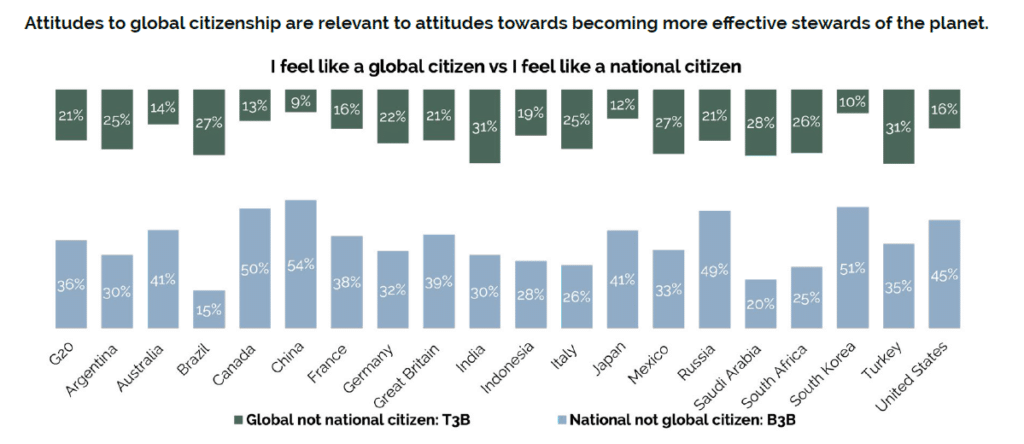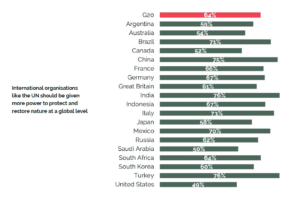A survey published in August and conducted on behalf of the Global Commons Alliance in G20 nations reveals that on average 64% of the general public believe that international organisations like the UN should be given more power to protect climate and nature.
Summarising the results, global sustainability analyst Owen Gaffney writes in the foreword of the study that the “vast majority of adults in G20 countries want to become better stewards of the planet. They want their governments to become better planetary stewards. They support the work of the United Nations to improve stewardship of the global commons. And they want governments to engage them more in this long-term vision.”
The survey quizzed individuals on a variety of topics such as: general awareness of the threat to humanity posed by ecological collapse; the extent to which people feel connected globally and trust one another to protect the global commons (oceans, forests, ice sheets, clean air and freshwater); the degree to which international cooperation is needed to solve global problems and how the pandemic has affected their perception of societal change.
The threat from collapsing ecosystems
It is abundantly clear from the study that people are aware of the pressure the natural environment is currently under. 73% of people surveyed agreed to the notion that the earth is close to a “tipping point” because of human action. In Indonesia, Turkey and Brazil the figure was above 80%. Furthermore, the study found that 83% of people across the G20 want to do more to protect and restore nature in the future. However, the study did not investigate what specific action people want to take in order to achieve this, although affordability and lack of knowledge were identified as the two main barriers to individuals who want to be better planetary stewards.
Attitudes to global citizenship
The survey examined views on global citizenship versus national citizenship by asking participants where they fall on a scale between 1 and 10, with one end of the spectrum representing stronger feelings of national identity and the other representing stronger feelings of global identity. 1 in 5 people surveyed (or 21%) were found to have a clear affinity with global citizenship, having responded 8 or higher on the scale, whereas 36% responded 3 or lower, thus indicating a clear feeling of national belonging. Not surprisingly, those who have an affinity with global citizenship are more likely to support greater international cooperation to solve global commons challenges, have greater trust in others to act to protect the global commons and believe the benefits of action to protect the global commons outweigh the costs.

Stronger global collaboration
The study shows that on average 66% of people across G20 countries support global cooperation to solve global challenges. Support is highest in emerging economies: China (81%), Brazil (77%), Turkey (76%), India (75%) and Indonesia (72%). As previously stated, a similar percentage of people (64%) think “international organisations like the UN” should be given more power to protect climate and nature. Again, emerging economies were the most supportive of this view: India (76%), China (75%) and Brazil (71%) but the study notes that the figures were also “quite high” in the lowest-scoring countries: United States (49%), Saudi Arabia (50%) and Canada (52%).

The impact of the COVID-19 pandemic
According to the survey, the pandemic has made people more open to societal change. Three quarters of respondents agree that the pandemic has shown that it is possible for people to transform behaviour very rapidly. Moreover, a similar proportion (71%) agree the pandemic recovery is a unique moment to build societies more resilient to future shocks and approximately a third of the public felt that people are now more aware of how interconnected societies are since the outbreak of COVID-19.
Conclusions
In short, this survey highlights that people are aware that humanity is facing a climate and environmental crisis. What’s interesting is that a majority want to take more action, believe that global cooperation is necessary, and support a strengthening of the United Nations. Previous surveys covered on this blog showed similar results and even indicated majority support for supranational decision-making and a global parliament and government. However, this strong preference for collaboration is still not reflected in international action.
Methodology
Data was collected through an Ipsos i-Omnibus Online Panel survey, run between 27th April and 14th May 2021. Within each country, data has been weighted to be broadly representative of the profile of the population aged 16-75. The sample for the survey was 19,735 adults aged 16-75 across the G20: around 1,000 interviews in each country.





